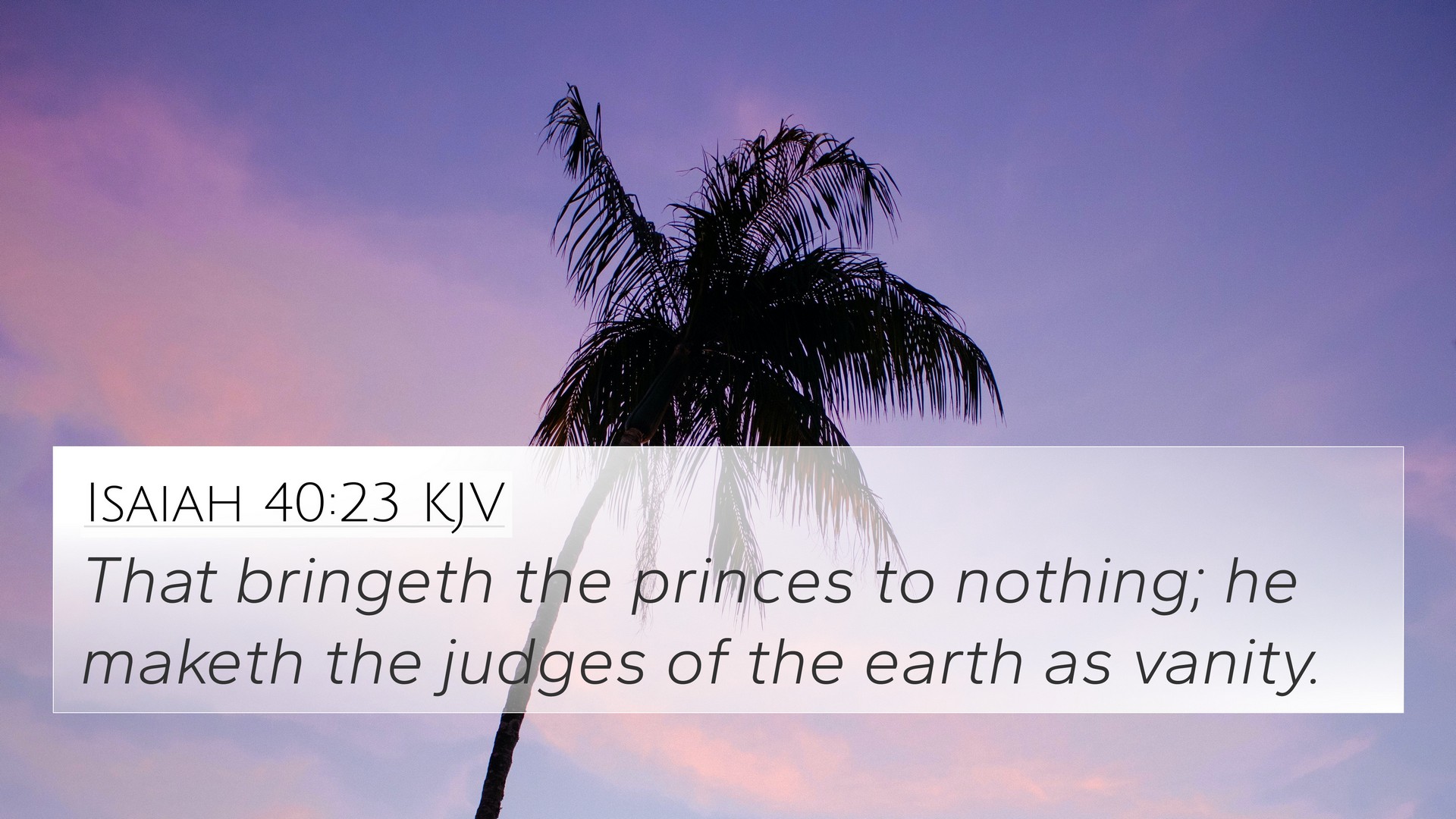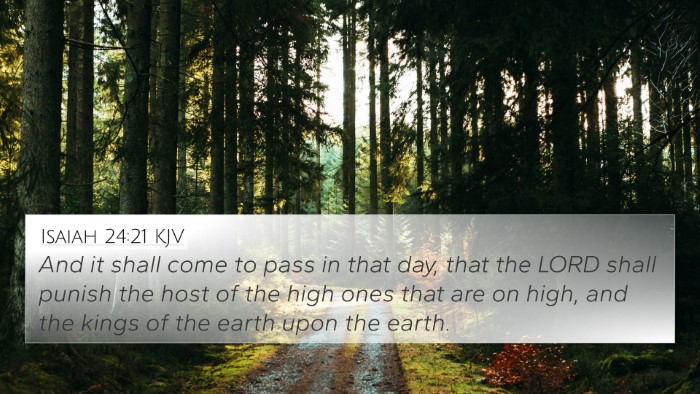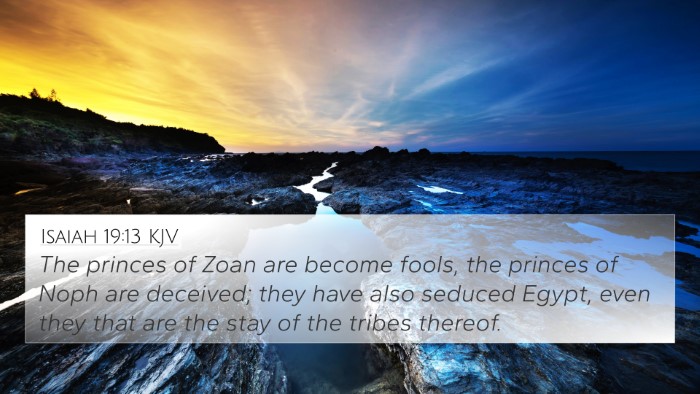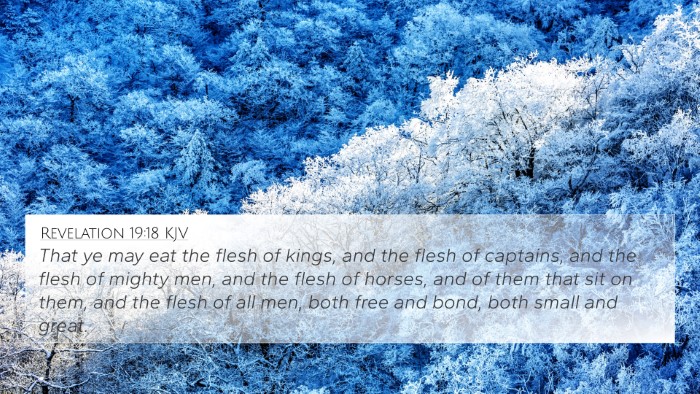Understanding Isaiah 40:23
Isaiah 40:23 states: "He brings princes to nothing; and the judges of the earth makes vanity." This profound verse conveys the sovereignty of God over earthly powers and authorities. Through the lens of public domain commentaries such as those by Matthew Henry, Albert Barnes, and Adam Clarke, we can derive a more nuanced understanding of its meaning.
Exegesis of Isaiah 40:23
This scripture highlights God's absolute control over human affairs, emphasizing that no matter how significant earthly rulers may seem, they ultimately hold no power against the omnipotence of God. The verse encourages readers to reflect upon the transient nature of worldly authority.
Commentary Insights
- Matthew Henry: Henry emphasizes the idea that God has the power to reduce even the greatest of earthly leaders to nothingness. The passage serves as a reminder that reliance on human strength is futile when compared to the sovereignty of the Almighty.
- Albert Barnes: Barnes notes that the mention of 'princes' refers to the high-ranking officials and leaders of nations, whose decisions often impact the masses. However, they are insignificant in the grand scheme of God’s overarching governance.
- Adam Clarke: Clarke illustrates that this verse reassures believers of God's supremacy over all creation. He also points out that judges, representing authority and law, can be made powerless by divine action, which serves as a comfort to those who may feel oppressed by these powers.
Thematic Bible Verse Connections
Isaiah 40:23 can be cross-referenced with several other scriptures that resonate with its themes of divine sovereignty and the impermanence of human authority. Here are some key references:
- Psalm 146:3-4: "Put not your trust in princes, nor in the son of man, in whom there is no help. His breath goes forth, he returns to his earth; in that very day his thoughts perish."
- Proverbs 21:30-31: "There is no wisdom, nor understanding, nor counsel against the Lord. The horse is prepared against the day of battle: but safety is of the Lord."
- Job 34:19: "How much less to him that accepteth not the persons of princes, nor regardeth the rich more than the poor; for they all are the work of his hands."
- Daniel 4:35: "And all the inhabitants of the earth are reputed as nothing: and he doeth according to his will in the army of heaven, and among the inhabitants of the earth: and none can stay his hand, or say unto him, What doest thou?"
- Romans 13:1: "Let every soul be subject unto the higher powers. For there is no power but of God: the powers that be are ordained of God."
- 1 Corinthians 1:27: "But God hath chosen the foolish things of the world to confound the wise; and God hath chosen the weak things of the world to confound the things which are mighty."
- Isaiah 2:11: "The lofty looks of man shall be humbled, and the haughtiness of men shall be brought low: and the Lord alone shall be exalted in that day."
Connecting Bible Verses
By examining these connections between Bible verses, one can see how they reinforce the central message of Isaiah 40:23. The thematic anchors found in comparisons across these scriptures unveil a broader narrative of God’s authority. This approach allows for a greater understanding of how various texts interact and enlightens readers on God’s consistent nature as ruler and judge.
Tools for Bible Cross-Referencing
To facilitate deeper insights into themes such as those explored in Isaiah 40:23, utilizing tools for Bible cross-referencing such as a Bible concordance or a cross-reference Bible study guide is invaluable. These tools help identify connections between various texts and shed light on the interplay of different passages within the Word of God.
Conclusion
Isaiah 40:23 serves as a pivotal reminder of God’s unyielding control over earthly affairs. The commentaries of respected theologians deepen our understanding of His dominion while the cross-referenced scriptures enrich our appreciation of the holistic message of the Bible. Through a comparative Bible verse analysis, we come to grasp not only the significance of one verse but the interconnectedness of God’s Word as a whole.
Further Reflections
For those seeking to broaden their knowledge about the connections between the Old and New Testaments or the roles of prophets and apostolic teachings within scripture, utilizing Bible reference resources and exploring the inter-Biblical dialogue can provide profound insights. Understanding these relationships through careful study equips believers to relate God's eternal truths to contemporary life.













